北师版(2019) 选择性必修二 Unit 5 Education Lesson 3 Understanding课件(共30张PPT)
文档属性
| 名称 | 北师版(2019) 选择性必修二 Unit 5 Education Lesson 3 Understanding课件(共30张PPT) |

|
|
| 格式 | pptx | ||
| 文件大小 | 21.1MB | ||
| 资源类型 | 教案 | ||
| 版本资源 | 北师大版(2019) | ||
| 科目 | 英语 | ||
| 更新时间 | 2023-08-20 00:00:00 | ||
图片预览


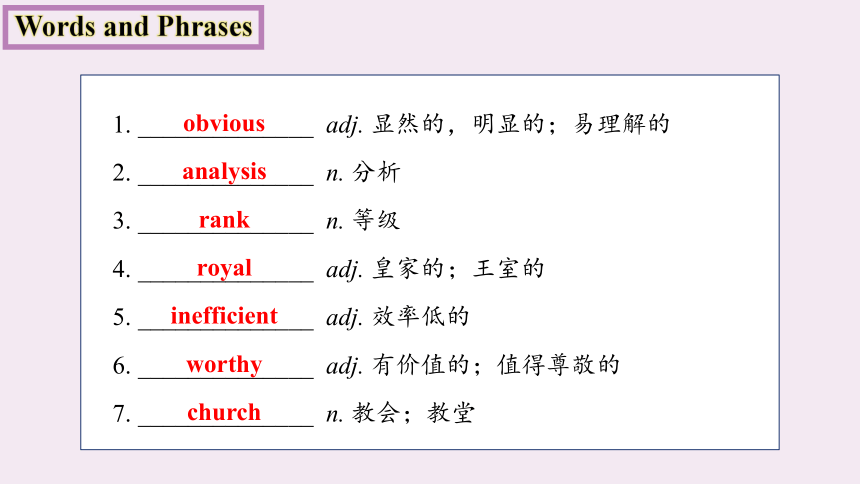
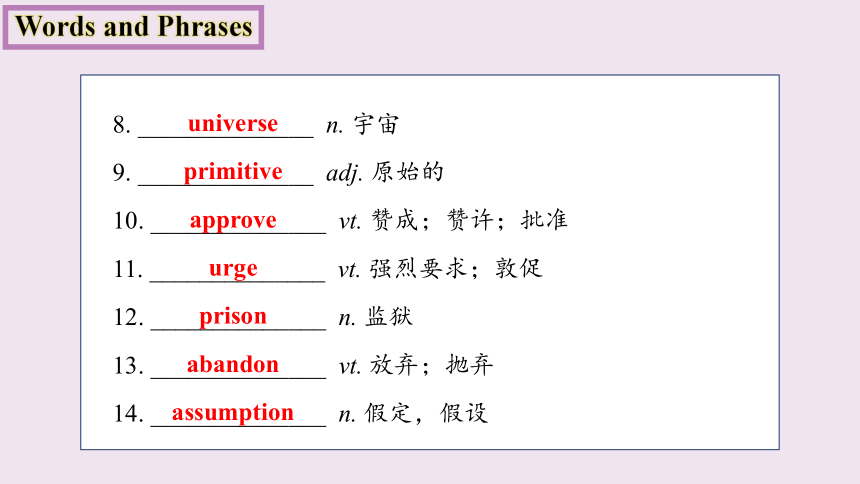
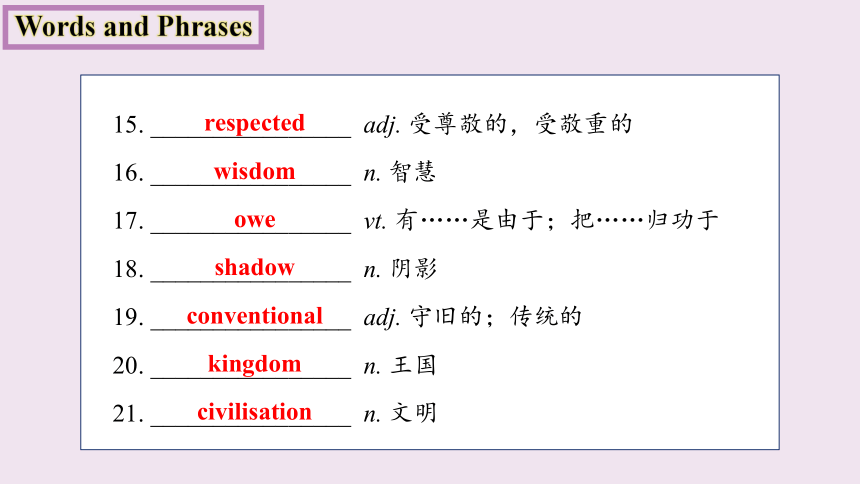
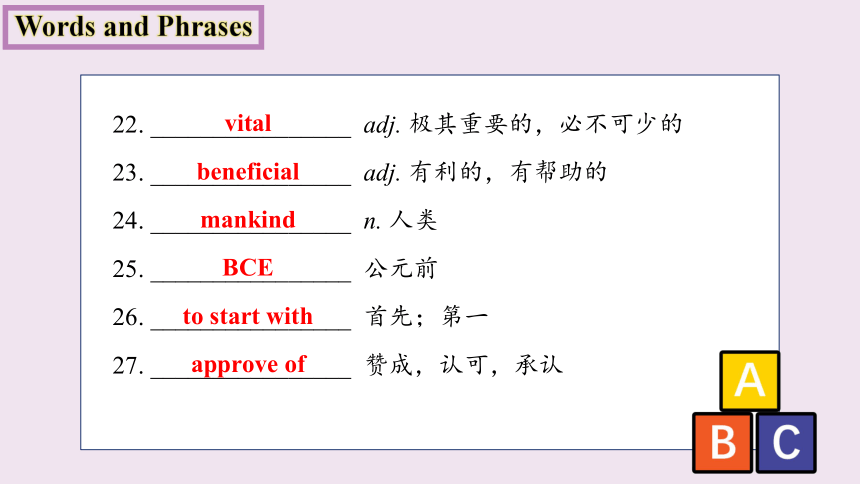
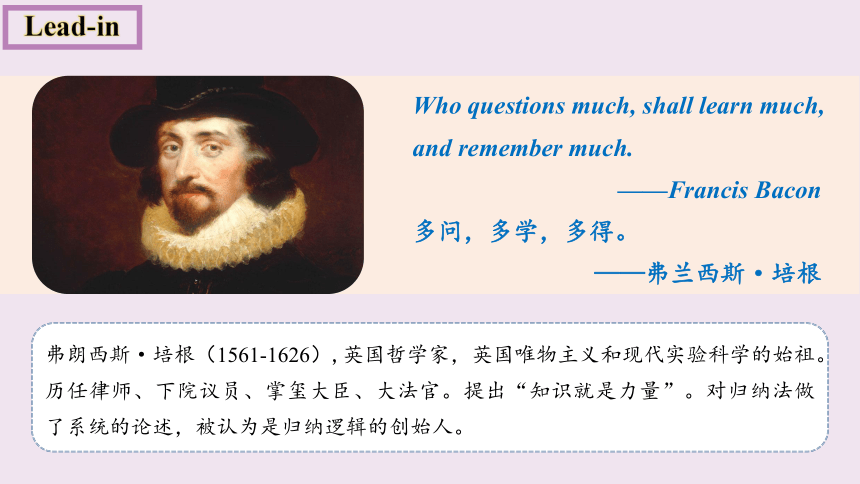
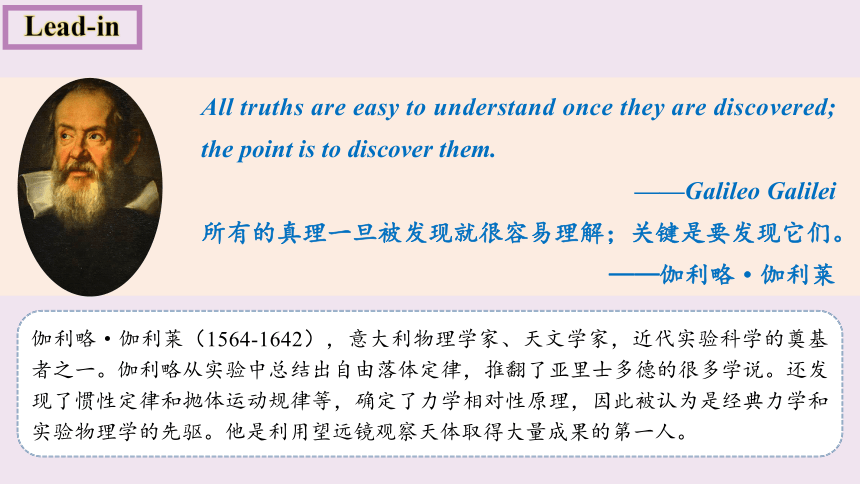
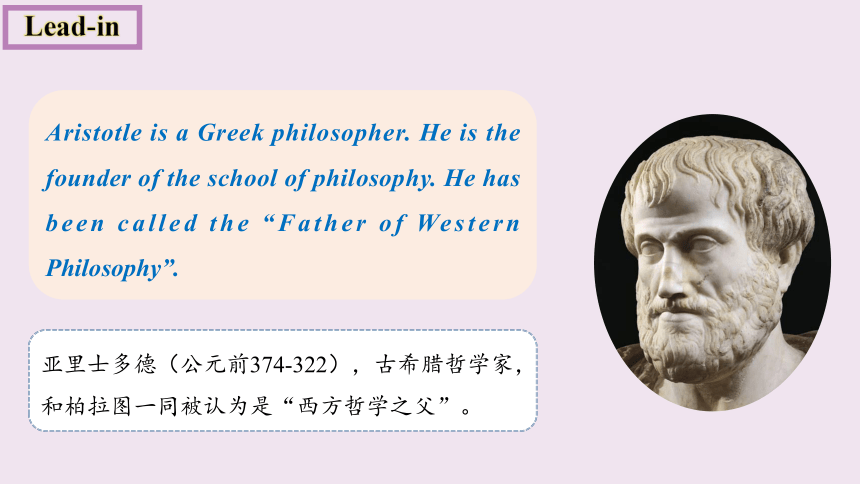

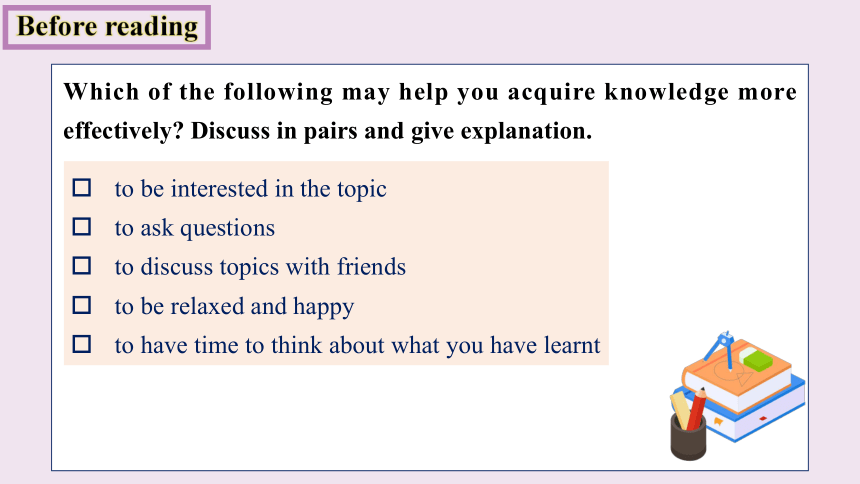
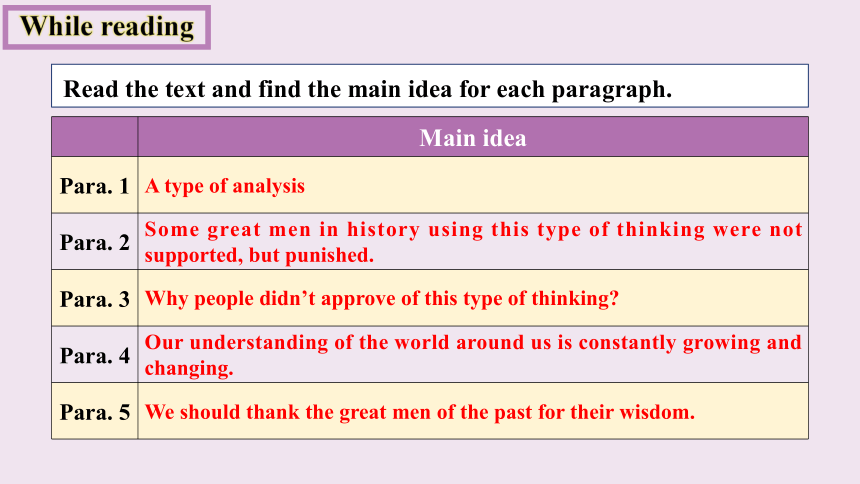
文档简介
(共30张PPT)
Unit 5 Education
Lesson 3 Understanding
北师大版(2019) 选择性必修二
In this section, you are going to:
read and talk about how to acquire knowledge and achieve understanding;
read for deep understanding, summarise information and understand coherence in context;
learn about some new words and phrases in context.
Learning objectives
1. ______________ adj. 显然的,明显的;易理解的
2. ______________ n. 分析
3. ______________ n. 等级
4. ______________ adj. 皇家的;王室的
5. ______________ adj. 效率低的
6. ______________ adj. 有价值的;值得尊敬的
7. ______________ n. 教会;教堂
obvious
analysis
rank
royal
inefficient
worthy
church
Words and Phrases
8. ______________ n. 宇宙
9. ______________ adj. 原始的
10. ______________ vt. 赞成;赞许;批准
11. ______________ vt. 强烈要求;敦促
12. ______________ n. 监狱
13. ______________ vt. 放弃;抛弃
14. ______________ n. 假定,假设
universe
primitive
approve
urge
prison
abandon
assumption
Words and Phrases
15. ________________ adj. 受尊敬的,受敬重的
16. ________________ n. 智慧
17. ________________ vt. 有……是由于;把……归功于
18. ________________ n. 阴影
19. ________________ adj. 守旧的;传统的
20. ________________ n. 王国
21. ________________ n. 文明
respected
wisdom
owe
shadow
conventional
kingdom
civilisation
Words and Phrases
22. ________________ adj. 极其重要的,必不可少的
23. ________________ adj. 有利的,有帮助的
24. ________________ n. 人类
25. ________________ 公元前
26. ________________ 首先;第一
27. ________________ 赞成,认可,承认
vital
beneficial
mankind
BCE
to start with
approve of
Words and Phrases
Lead-in
弗朗西斯·培根(1561-1626),英国哲学家,英国唯物主义和现代实验科学的始祖。历任律师、下院议员、掌玺大臣、大法官。提出“知识就是力量”。对归纳法做了系统的论述,被认为是归纳逻辑的创始人。
Who questions much, shall learn much, and remember much.
——Francis Bacon
多问,多学,多得。
——弗兰西斯·培根
Lead-in
伽利略·伽利莱(1564-1642),意大利物理学家、天文学家,近代实验科学的奠基者之一。伽利略从实验中总结出自由落体定律,推翻了亚里士多德的很多学说。还发现了惯性定律和抛体运动规律等,确定了力学相对性原理,因此被认为是经典力学和实验物理学的先驱。他是利用望远镜观察天体取得大量成果的第一人。
All truths are easy to understand once they are discovered; the point is to discover them.
——Galileo Galilei
所有的真理一旦被发现就很容易理解;关键是要发现它们。
——伽利略·伽利莱
Lead-in
亚里士多德(公元前374-322),古希腊哲学家,和柏拉图一同被认为是“西方哲学之父”。
Aristotle is a Greek philosopher. He is the founder of the school of philosophy. He has been called the “Father of Western Philosophy”.
Before reading
1. Do you know some popular facts finally proved to be false
2. Do you completely believe what great scientists said
Before reading
Which of the following may help you acquire knowledge more effectively Discuss in pairs and give explanation.
to be interested in the topic
to ask questions
to discuss topics with friends
to be relaxed and happy
to have time to think about what you have learnt
Read the text and find the main idea for each paragraph.
Main idea
Para. 1
Para. 2
Para. 3
Para. 4
Para. 5
Some great men in history using this type of thinking were not supported, but punished.
Why people didn’t approve of this type of thinking
A type of analysis
We should thank the great men of the past for their wisdom.
Our understanding of the world around us is constantly growing and changing.
While reading
Read paragraph 1. According to the writer, how do we acquire knowledge and achieve understanding Complete the flow chart.
While reading
To start with, we need __________.
questions
Then, to find answers, we _________________
_________________________.
observe the world around us and study the facts
After that, we________ _________________________________________________.
consider possible answers and test each to find the right ones
Read paragraphs 2-3. Complete the sentences.
1. Francis Bacon believed that the way to gain knowledge is _________. But most people in his days believed _________________.
2. Galileo Galilei proved that ________________________________________. But many people in his days ______________________________________________
______________________________________________.
3. Aristotle’s understanding of the universe was that __________________________
_____________ because __________________________________.
4. It is still often true today that __________________________________________
____________________.
thinking
more in religion
the Earth was not the centre of the universe
tended to ignore the facts and didn’t want to challenge what they had always comfortably believed
While reading
the Earth must be the centre of the universe
it felt like the Earth was standing still
people don’t want to abandon what they’ve always thought as true
While reading
Answer the questions.
1. What position did Bacon hold during his days and what was his true interest
Bacon held an important rank under King James (1566-1625) of England. His true interest was the worthy search for knowledge.
2. At first people approved of Galilei’s studies, but later they got angry. Why
They didn’t want to challenge what they had always thought was true.
3. Why did people choose to believe views that were about 2,000 years old
Because they were unwilling to challenge what they had always comfortably believed.
While reading
4. Were great men in history always correct Give examples.
No. Galilei made mistakes. He believed that the Earth moved round the sun in a perfect circle. But he was wrong.
5. According to the writer, will anyone be in the position to say “We know it all.” Use examples to explain.
None of us can say “We know it all”. Bacon and Galilei knew that knowledge and understanding are things to fight for.
Find out what each pronoun refers to in the text.
Example After that, we consider possible answers and test each to find the right ones. (Para.1) ones= answers
1. ... he was going against the views of the day. (Para. 2) he = ________________
2. This was certainly not the interest ...
(Para. 2) This = ___________________
3. ... what they had always comfortably believed. (Para. 2) they = ___________
_________________________________
the search for knowledge
Francis Bacon
the church and most people
After reading
4. … they grew angry and put him in prison (Para. 3) they = __________
5. … then it must be so. (Para. 3)
it = _____________
6. He is now known as … (Para. 3)
He = ___________
people
assumption
Galilei
After reading
Understanding Coherence in Context
The repetition of key terms or phrases makes meaning coherent in a text.
The use of synonyms and antonyms helps enhance coherence in a text.
Linking words such as since, so, afterwards, then, although, but, however, etc. can help connect meanings in sentences.
Pronouns such as he, she, it, they, etc. help carry meaning on into the next point in a text.
Skill Builder
After reading
Circle the linking words in the text that the writer used in order to express his / her opinion coherently.
It seems obvious now how we acquire knowledge and understanding. To start with, we need questions. Then, to find answers, we observe the world around us and study the facts. After that, we consider possible answers and test each to find the right ones. Although today we are more used to typing a few key words into a search engine and waiting for the Internet to give us an answer, modern scientists and thinkers are still solving the world’s problems with this type of analysis—luckily for us.
However, in the 17th century when Francis Bacon (1561-1626) suggested that this type of thinking was the way to gain knowledge, he was going against the views of the day. Although Bacon held an important rank in King James’ royal court of England, his true interest was not the day-to-day, slow and inefficient working style of the government, but the worthy search for knowledge. This was certainly not the interest of most people in his days. At that time, people believed more in the church than in facts, and people like Galileo Galilei (1564-1642), who proved the idea that “the Earth is not the centre of the universe”, were often punished by the church with no one coming to their defence.
After reading
The church and many people tended to ignore the facts and didn’t want to challenge what they had always comfortably believed. In fact, when Galilei proved that the Earth was not the centre of the universe, instead of believing him, people chose to believe views that were almost 2,000 years old!
It is not surprising that people wanted to believe these primitive ideas as they had been put forward by the great philosopher Aristotle (384-322 BCE). He said that the Earth must be the centre of the universe because it felt like the Earth was standing still. Galilei disagreed. At first, people approved of his studies and urged him to continue, but later when he proved Aristotle wrong, they grew angry and put him in prison. They didn’t want to abandon what they’d always thought as true. And this is still often true today. People make the assumption that if someone important and respected says that something is right, then it must be so. But even though Aristotle was a great man who inspired many great scientists and philosophers after him, he was wrong at times. And Galilei also made mistakes. He is now known as the father of astronomy but he believed that the Earth moved round the sun in a perfect circle. He was wrong.
After reading
Therefore, our understanding of the world around us is constantly growing and changing. In other words, we learn more every day and none of us can ever sit back and say, “We know it all.” We need to thank the great men of the past for their wisdom. They understood that we don’t know everything and probably never will, as this would mean a world with questions.
We owe so much of our knowledge and understanding of the world to people like Bacon and Galilei, who were brave enough to step out from the shadows of conventional thought in order to find the kingdom of knowledge that today’s civilisation is built upon. These men knew that knowledge and understanding are things to fight for; more vital to a man, and more beneficial to mankind, some might say, than all the money in the world.
After reading
Think and share
1. What do you think the last sentence of the passage means
I think the last sentence of the text means that knowledge and understanding are more important than money. They are more helpful and useful because they can guide our ways of learning about the world and help us solve problems all the time while money can just buy certain goods and solve problems for some time.
We owe so much of our knowledge and understanding of the world to people like Bacon and Galilei, who were brave enough to step out from the shadows of conventional thought in order to find the kingdom of knowledge that today’s civilisation is built upon. These men knew that knowledge and understanding are things to fight for; more vital to a man, and more beneficial to mankind, some might say, than all the money in the world.
原文
After reading
2. What is the writer’s attitude towards the way to acquire knowledge How did the writer make his / her opinion clear to the readers Underline the expressions that show the writer’s attitude.
The writer’s attitude to acquiring knowledge is to keep asking questions and respect facts. We do not just accept answers from authority.
The writer illustrated his / her points by using examples of Galilei and ideas from great thinker like Bacon.
The expressions that show the writer’s attitudes are like: it seems obvious, luckily for us, however, it is not surprising, primitive ideas, it felt like, make the assumption, was wrong at times, sit back and say, a world with questions, owe so much ... to, step out from the shadow, to find the kingdom of knowledge, more vital to, more beneficial to ...
After reading
The following sentences all contain false information. Use the words and phrases below to correct them.
inefficient approve of didn’t want to
abandon constantly growing and changing continue
1. In Bacon’s days, the working style of the government was very efficient.
_____________________________________________________________________
2. People were strongly against Galilei’s studies at first and then they urged him to give up.
_____________________________________________________________________
3. Our understanding of the world is stable.
_____________________________________________________________________
4. People in the past were willing to give up what they had always thought as true.
_____________________________________________________________________
In Bacon’s days, the working style of the government was very inefficient.
People approved of Galilei’s studies at first and then they urged him to continue.
Our understanding of the world is constantly growing and changing.
People in the past didn’t want to abandon what they had always thought as true.
After reading
Look at the Word Builder. Find the verbs or phrases from the text that can go together with the nouns given. And add more.
Word Builder
knowledge
acquire
gain
learn
accumulate
idea
put
forward
prove
put
forth
come up
with
get
After reading
Look at the Word Builder. Find the verbs or phrases from the text that can go together with the nouns given. And add more.
Word Builder
problem
solve
come
across
fact
study
ignore
accept
neglect
know
After reading
Look at the three critical thinking questions below. Prepare at least two more questions you can ask about this passage. Then ask and answer the questions in groups.
Why did the writer write this passage
How do I know what I’m reading is true
What is the relationship between the ideas in the text
Language points
1. To start with, we need questions.
首先,我们需要问题。
to start with 首先;第一
【例句】
① To start with, you need to read some reference books.
首先,你需要读一些参考书。
② To start with, where and when did it happen
首先,这事发生在何时何地?
③ To start with, the pressure on her was very heavy, but it’s eased off a bit now.
一开始,她的压力很大,但现在已经好些了。
④ Success was assured and, at least to start with, the system operated smoothly.
成功有保证了,至少该系统一开始运行得挺顺利。
Language points
2. At first, people approved of his studies and urged him to continue, but later when he proved Aristotle wrong, they grew angry and put him in prison.
起初人们认可他的研究成果,催促他继续研究,但是当他证实亚里士多德有错时,他们生气了,并把他送进了监狱。
approve of 赞成,认可,承认
【例句】
① I strongly approve of your proposal. 我十分赞同你的提议。
② The boss wouldn’t approve of the plan. 老板不会赞成这个计划。
③ She doesn’t approve of me leaving school this year.
=She doesn’t approve of my leaving school this year. 她不同意我今年离校。
④ Mary took it for granted that they would approve of the idea.
玛丽想当然地认为他们一定会同意这个想法。
Thank you
Unit 5 Education
Lesson 3 Understanding
北师大版(2019) 选择性必修二
In this section, you are going to:
read and talk about how to acquire knowledge and achieve understanding;
read for deep understanding, summarise information and understand coherence in context;
learn about some new words and phrases in context.
Learning objectives
1. ______________ adj. 显然的,明显的;易理解的
2. ______________ n. 分析
3. ______________ n. 等级
4. ______________ adj. 皇家的;王室的
5. ______________ adj. 效率低的
6. ______________ adj. 有价值的;值得尊敬的
7. ______________ n. 教会;教堂
obvious
analysis
rank
royal
inefficient
worthy
church
Words and Phrases
8. ______________ n. 宇宙
9. ______________ adj. 原始的
10. ______________ vt. 赞成;赞许;批准
11. ______________ vt. 强烈要求;敦促
12. ______________ n. 监狱
13. ______________ vt. 放弃;抛弃
14. ______________ n. 假定,假设
universe
primitive
approve
urge
prison
abandon
assumption
Words and Phrases
15. ________________ adj. 受尊敬的,受敬重的
16. ________________ n. 智慧
17. ________________ vt. 有……是由于;把……归功于
18. ________________ n. 阴影
19. ________________ adj. 守旧的;传统的
20. ________________ n. 王国
21. ________________ n. 文明
respected
wisdom
owe
shadow
conventional
kingdom
civilisation
Words and Phrases
22. ________________ adj. 极其重要的,必不可少的
23. ________________ adj. 有利的,有帮助的
24. ________________ n. 人类
25. ________________ 公元前
26. ________________ 首先;第一
27. ________________ 赞成,认可,承认
vital
beneficial
mankind
BCE
to start with
approve of
Words and Phrases
Lead-in
弗朗西斯·培根(1561-1626),英国哲学家,英国唯物主义和现代实验科学的始祖。历任律师、下院议员、掌玺大臣、大法官。提出“知识就是力量”。对归纳法做了系统的论述,被认为是归纳逻辑的创始人。
Who questions much, shall learn much, and remember much.
——Francis Bacon
多问,多学,多得。
——弗兰西斯·培根
Lead-in
伽利略·伽利莱(1564-1642),意大利物理学家、天文学家,近代实验科学的奠基者之一。伽利略从实验中总结出自由落体定律,推翻了亚里士多德的很多学说。还发现了惯性定律和抛体运动规律等,确定了力学相对性原理,因此被认为是经典力学和实验物理学的先驱。他是利用望远镜观察天体取得大量成果的第一人。
All truths are easy to understand once they are discovered; the point is to discover them.
——Galileo Galilei
所有的真理一旦被发现就很容易理解;关键是要发现它们。
——伽利略·伽利莱
Lead-in
亚里士多德(公元前374-322),古希腊哲学家,和柏拉图一同被认为是“西方哲学之父”。
Aristotle is a Greek philosopher. He is the founder of the school of philosophy. He has been called the “Father of Western Philosophy”.
Before reading
1. Do you know some popular facts finally proved to be false
2. Do you completely believe what great scientists said
Before reading
Which of the following may help you acquire knowledge more effectively Discuss in pairs and give explanation.
to be interested in the topic
to ask questions
to discuss topics with friends
to be relaxed and happy
to have time to think about what you have learnt
Read the text and find the main idea for each paragraph.
Main idea
Para. 1
Para. 2
Para. 3
Para. 4
Para. 5
Some great men in history using this type of thinking were not supported, but punished.
Why people didn’t approve of this type of thinking
A type of analysis
We should thank the great men of the past for their wisdom.
Our understanding of the world around us is constantly growing and changing.
While reading
Read paragraph 1. According to the writer, how do we acquire knowledge and achieve understanding Complete the flow chart.
While reading
To start with, we need __________.
questions
Then, to find answers, we _________________
_________________________.
observe the world around us and study the facts
After that, we________ _________________________________________________.
consider possible answers and test each to find the right ones
Read paragraphs 2-3. Complete the sentences.
1. Francis Bacon believed that the way to gain knowledge is _________. But most people in his days believed _________________.
2. Galileo Galilei proved that ________________________________________. But many people in his days ______________________________________________
______________________________________________.
3. Aristotle’s understanding of the universe was that __________________________
_____________ because __________________________________.
4. It is still often true today that __________________________________________
____________________.
thinking
more in religion
the Earth was not the centre of the universe
tended to ignore the facts and didn’t want to challenge what they had always comfortably believed
While reading
the Earth must be the centre of the universe
it felt like the Earth was standing still
people don’t want to abandon what they’ve always thought as true
While reading
Answer the questions.
1. What position did Bacon hold during his days and what was his true interest
Bacon held an important rank under King James (1566-1625) of England. His true interest was the worthy search for knowledge.
2. At first people approved of Galilei’s studies, but later they got angry. Why
They didn’t want to challenge what they had always thought was true.
3. Why did people choose to believe views that were about 2,000 years old
Because they were unwilling to challenge what they had always comfortably believed.
While reading
4. Were great men in history always correct Give examples.
No. Galilei made mistakes. He believed that the Earth moved round the sun in a perfect circle. But he was wrong.
5. According to the writer, will anyone be in the position to say “We know it all.” Use examples to explain.
None of us can say “We know it all”. Bacon and Galilei knew that knowledge and understanding are things to fight for.
Find out what each pronoun refers to in the text.
Example After that, we consider possible answers and test each to find the right ones. (Para.1) ones= answers
1. ... he was going against the views of the day. (Para. 2) he = ________________
2. This was certainly not the interest ...
(Para. 2) This = ___________________
3. ... what they had always comfortably believed. (Para. 2) they = ___________
_________________________________
the search for knowledge
Francis Bacon
the church and most people
After reading
4. … they grew angry and put him in prison (Para. 3) they = __________
5. … then it must be so. (Para. 3)
it = _____________
6. He is now known as … (Para. 3)
He = ___________
people
assumption
Galilei
After reading
Understanding Coherence in Context
The repetition of key terms or phrases makes meaning coherent in a text.
The use of synonyms and antonyms helps enhance coherence in a text.
Linking words such as since, so, afterwards, then, although, but, however, etc. can help connect meanings in sentences.
Pronouns such as he, she, it, they, etc. help carry meaning on into the next point in a text.
Skill Builder
After reading
Circle the linking words in the text that the writer used in order to express his / her opinion coherently.
It seems obvious now how we acquire knowledge and understanding. To start with, we need questions. Then, to find answers, we observe the world around us and study the facts. After that, we consider possible answers and test each to find the right ones. Although today we are more used to typing a few key words into a search engine and waiting for the Internet to give us an answer, modern scientists and thinkers are still solving the world’s problems with this type of analysis—luckily for us.
However, in the 17th century when Francis Bacon (1561-1626) suggested that this type of thinking was the way to gain knowledge, he was going against the views of the day. Although Bacon held an important rank in King James’ royal court of England, his true interest was not the day-to-day, slow and inefficient working style of the government, but the worthy search for knowledge. This was certainly not the interest of most people in his days. At that time, people believed more in the church than in facts, and people like Galileo Galilei (1564-1642), who proved the idea that “the Earth is not the centre of the universe”, were often punished by the church with no one coming to their defence.
After reading
The church and many people tended to ignore the facts and didn’t want to challenge what they had always comfortably believed. In fact, when Galilei proved that the Earth was not the centre of the universe, instead of believing him, people chose to believe views that were almost 2,000 years old!
It is not surprising that people wanted to believe these primitive ideas as they had been put forward by the great philosopher Aristotle (384-322 BCE). He said that the Earth must be the centre of the universe because it felt like the Earth was standing still. Galilei disagreed. At first, people approved of his studies and urged him to continue, but later when he proved Aristotle wrong, they grew angry and put him in prison. They didn’t want to abandon what they’d always thought as true. And this is still often true today. People make the assumption that if someone important and respected says that something is right, then it must be so. But even though Aristotle was a great man who inspired many great scientists and philosophers after him, he was wrong at times. And Galilei also made mistakes. He is now known as the father of astronomy but he believed that the Earth moved round the sun in a perfect circle. He was wrong.
After reading
Therefore, our understanding of the world around us is constantly growing and changing. In other words, we learn more every day and none of us can ever sit back and say, “We know it all.” We need to thank the great men of the past for their wisdom. They understood that we don’t know everything and probably never will, as this would mean a world with questions.
We owe so much of our knowledge and understanding of the world to people like Bacon and Galilei, who were brave enough to step out from the shadows of conventional thought in order to find the kingdom of knowledge that today’s civilisation is built upon. These men knew that knowledge and understanding are things to fight for; more vital to a man, and more beneficial to mankind, some might say, than all the money in the world.
After reading
Think and share
1. What do you think the last sentence of the passage means
I think the last sentence of the text means that knowledge and understanding are more important than money. They are more helpful and useful because they can guide our ways of learning about the world and help us solve problems all the time while money can just buy certain goods and solve problems for some time.
We owe so much of our knowledge and understanding of the world to people like Bacon and Galilei, who were brave enough to step out from the shadows of conventional thought in order to find the kingdom of knowledge that today’s civilisation is built upon. These men knew that knowledge and understanding are things to fight for; more vital to a man, and more beneficial to mankind, some might say, than all the money in the world.
原文
After reading
2. What is the writer’s attitude towards the way to acquire knowledge How did the writer make his / her opinion clear to the readers Underline the expressions that show the writer’s attitude.
The writer’s attitude to acquiring knowledge is to keep asking questions and respect facts. We do not just accept answers from authority.
The writer illustrated his / her points by using examples of Galilei and ideas from great thinker like Bacon.
The expressions that show the writer’s attitudes are like: it seems obvious, luckily for us, however, it is not surprising, primitive ideas, it felt like, make the assumption, was wrong at times, sit back and say, a world with questions, owe so much ... to, step out from the shadow, to find the kingdom of knowledge, more vital to, more beneficial to ...
After reading
The following sentences all contain false information. Use the words and phrases below to correct them.
inefficient approve of didn’t want to
abandon constantly growing and changing continue
1. In Bacon’s days, the working style of the government was very efficient.
_____________________________________________________________________
2. People were strongly against Galilei’s studies at first and then they urged him to give up.
_____________________________________________________________________
3. Our understanding of the world is stable.
_____________________________________________________________________
4. People in the past were willing to give up what they had always thought as true.
_____________________________________________________________________
In Bacon’s days, the working style of the government was very inefficient.
People approved of Galilei’s studies at first and then they urged him to continue.
Our understanding of the world is constantly growing and changing.
People in the past didn’t want to abandon what they had always thought as true.
After reading
Look at the Word Builder. Find the verbs or phrases from the text that can go together with the nouns given. And add more.
Word Builder
knowledge
acquire
gain
learn
accumulate
idea
put
forward
prove
put
forth
come up
with
get
After reading
Look at the Word Builder. Find the verbs or phrases from the text that can go together with the nouns given. And add more.
Word Builder
problem
solve
come
across
fact
study
ignore
accept
neglect
know
After reading
Look at the three critical thinking questions below. Prepare at least two more questions you can ask about this passage. Then ask and answer the questions in groups.
Why did the writer write this passage
How do I know what I’m reading is true
What is the relationship between the ideas in the text
Language points
1. To start with, we need questions.
首先,我们需要问题。
to start with 首先;第一
【例句】
① To start with, you need to read some reference books.
首先,你需要读一些参考书。
② To start with, where and when did it happen
首先,这事发生在何时何地?
③ To start with, the pressure on her was very heavy, but it’s eased off a bit now.
一开始,她的压力很大,但现在已经好些了。
④ Success was assured and, at least to start with, the system operated smoothly.
成功有保证了,至少该系统一开始运行得挺顺利。
Language points
2. At first, people approved of his studies and urged him to continue, but later when he proved Aristotle wrong, they grew angry and put him in prison.
起初人们认可他的研究成果,催促他继续研究,但是当他证实亚里士多德有错时,他们生气了,并把他送进了监狱。
approve of 赞成,认可,承认
【例句】
① I strongly approve of your proposal. 我十分赞同你的提议。
② The boss wouldn’t approve of the plan. 老板不会赞成这个计划。
③ She doesn’t approve of me leaving school this year.
=She doesn’t approve of my leaving school this year. 她不同意我今年离校。
④ Mary took it for granted that they would approve of the idea.
玛丽想当然地认为他们一定会同意这个想法。
Thank you
同课章节目录
- Unit 4 Humour
- Lesson 1 What’s So Funny?
- Lesson 2 Why Do We Need Humour?
- Lesson 3 My Favourite Comedian
- Unit 5 Education
- Lesson 1 Enlightening a Mind
- Lesson 2 The Objectives of Education
- Lesson 3 Understanding
- Unit 6 The Media
- Lesson 1 From Page to Screen
- Lesson 2 Questions about Media
- Lesson 3 The Advertising Game
